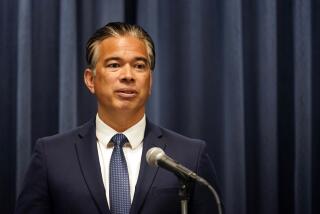Problems in Southland a Factor : Freddie Mac Setting Up Mortgage-Fraud Unit
- Share via
The Federal Home Loan Mortgage Corp., a publicly chartered agency that buys home mortgages from lenders, packages them and sells them to investors, disclosed Thursday that it is establishing a unit to fight mortgage-related fraud.
Officials from Freddie Mac, as the agency is called, said the problem--which can involve such things as providing false credit information on loan documents or loans arranged for phony property sales--has been especially bad in Southern California, compared to other parts of the country.
The reason, they said, is that soaring home and land prices in the area in recent years have sparked increased activity by those making fraudulent loans. In addition, rising property values often mask fraudulent mortgages because a home can be quickly sold at a profit--and the loan paid off--before the bad information is detected.
Freddie Mac is based in Reston, Va. Chartered by Congress in 1970, it is owned by shareholders and provides a huge secondary market where lenders can sell mortgages.
Freddie Mac officials declined to provide specific numbers showing the extent of the problem. D. James Crost, the agency’s executive vice president for risk and property management, said nationwide there are “many millions of dollars in loans that have some level of fraud involved in them.”
Three Categories
He said, however, that Freddie Mac and the investors in its packaged mortgages have not been hit hard by fraudulent loans yet and that the fraud unit is being organized to prevent mortgage fraud from growing into a major problem.
There are dozens of ways that people can commit mortgage fraud. Methods typically fall into three categories: when a group of a lender’s employees collaborate in making fraudulent loans; when third parties, such as builders or mortgage brokers, are involved, and when borrowers commit fraud.
In a typical scheme, a builder or home seller seeking to make a sale might provide money for a down payment to someone who does not have the money and is likely to default on the loan. Or the fraud might involve pressuring an appraiser to value a property at more than it is worth so that a lender will agree to make a loan.
In some cases, people known as “straw buyers” are recruited to pose as home buyers for a fee and to obtain loans. After a period of time, the straw buyers default on the loans.
In one civil lawsuit now pending in U.S. District Court in Los Angeles, Freddie Mac is alleging fraud against a group of companies that includes Guardian Funding Corp. of San Mateo, Calif., Pioneer Commercial Funding Corp. of Sherman Oaks and Pentagon Investment Group of Beverly Hills.
In that case, Freddie Mac alleged that Pentagon Investment solicited straw buyers to buy property on which loans had been foreclosed or were nearing foreclosure. Loans made to buy the property were sold to Freddie Mac, which claims to have suffered at least $8 million in damages. In court papers, the defendants have denied the allegations.
Different Experience
Robert J. Engelstad, vice president for the Federal National Mortgage Assn., or Fannie Mae, another major buyer and reseller of mortgages, said Fannie Mae has people in regional offices who monitor mortgage fraud.
Engelstad said that, contrary to Freddie Mac’s experience, Fannie Mae has found mortgage fraud to be more common in areas where housing sales are slow or when interest rates are high because people have trouble selling their homes or qualifying for loans.
More to Read
Inside the business of entertainment
The Wide Shot brings you news, analysis and insights on everything from streaming wars to production — and what it all means for the future.
You may occasionally receive promotional content from the Los Angeles Times.










